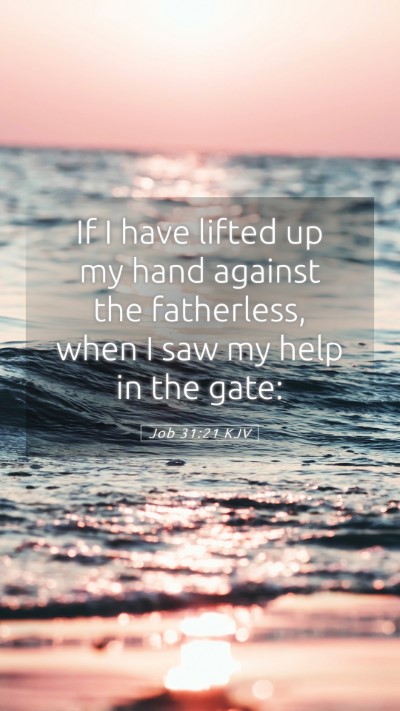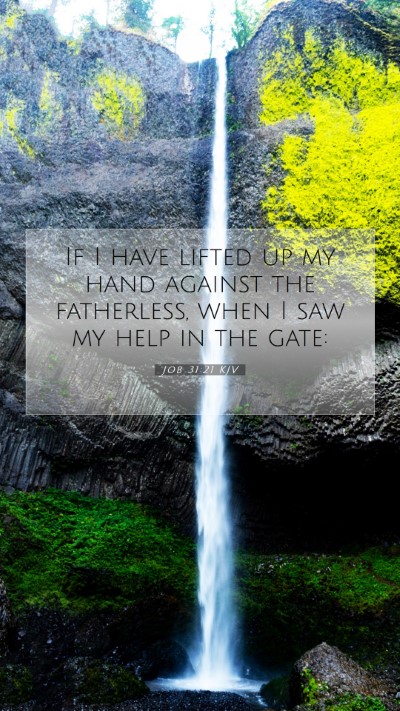Understanding Job 31:21 - A Comprehensive Bible Verse Commentary
Job 31:21 states: "If I have lifted up my hand against the fatherless, when I saw my help in the gate." This verse comes from the profound dialogue of Job, where he seeks to defend his integrity amid false accusations. Below is a combined analysis based on public domain commentaries, which offers a deep understanding of its meaning, significance, and application.
Context of the Verse
Job, experiencing immense suffering, ardently protests his innocence regarding the sins alleged against him. This verse specifically highlights Job's commitment to social justice and his care for the vulnerable, particularly orphans. The gate mentioned refers to a place of judgment and community decision-making, underscoring Job's moral integrity and his place in society as a protector of those in need.
Commentary Insights
-
Matthew Henry:
Henry emphasizes Job's strong moral principles and his inviolable stance against injustice. He points out that Job's integrity is exhibited in his refusal to exploit the weak, such as orphans, for personal gain. This moral high ground is a central theme in Job's discourse, signifying his respect for the poor and underprivileged.
-
Albert Barnes:
Barnes interprets this verse as a reflection of Job's character and his reputation. He explains that Job's actions towards the fatherless demonstrate his awareness of social responsibility and display his unblemished history of doing right by those without protection or advocacy. His acknowledgment of help coming 'in the gate' signifies his reliance on community support and justice.
-
Adam Clarke:
Clarke notes how Job's rhetorical question serves as a profound indictment against the hypocrisy of those who accuse him. By professing support for orphans, Job aligns himself with divine justice and righteousness, implying that any false claims against him should be scrutinized in light of his character and acts of kindness.
Meaning and Application of Job 31:21
-
Social Justice:
This verse encapsulates a cry for justice and compassion towards the vulnerable. Job exemplifies the heart of God towards the fatherless, encouraging believers to consider their own treatment of the marginalized in society, thus promoting awareness and action in social justice efforts.
-
Moral Responsibility:
To lift one's hand against the fatherless represents betrayal of moral duty. Job's integrity calls for reflection on how individuals uphold or fail their moral responsibilities in today's world, making this an essential theme for personal application in modern life.
-
Community and Advocacy:
Job’s mention of the gate as a place of help underscores the community's role in advocacy. This serves as a reminder of the importance of being actively involved in one’s community, ensuring that voices of the fatherless and marginalized are heard and supported.
Cross References
- Exodus 22:22 - "You shall not afflict any widow or fatherless child."
- Psalms 10:14 - "But you do see; for you behold trouble and grief, to repay it by your hand. The helpless commits himself to you; you are the helper of the fatherless."
- Proverbs 23:10-11 - "Do not remove the ancient landmark, nor enter the fields of the fatherless; for their Redeemer is mighty; He will plead their cause against you."
Conclusion
Job 31:21 serves as a powerful affirmation of integrity, justice, and social responsibility. It challenges readers to reflect on their own actions toward the vulnerable and encourages active engagement in advocacy. Through the insights garnered from biblical commentary, one can achieve a richer understanding of Scripture, leading to meaningful personal application and greater awareness of biblical principles in action.
As you delve into this verse and its implications, consider how Job’s commitment to defending the fatherless informs your understanding of biblical justice today. This analysis serves as a guiding framework for those seeking Bible verse explanations, commentary, and deeper scripture analysis. Engage with study groups or utilize online Bible study tools to further navigate these themes within your spiritual practice.


